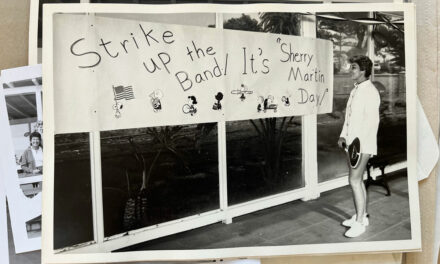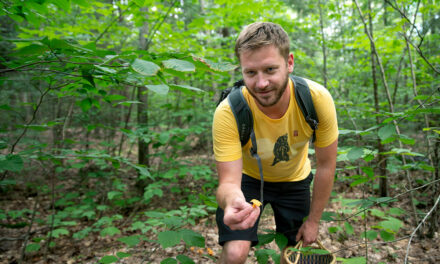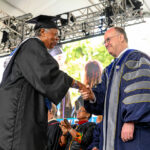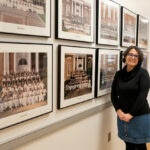
Matters of the Heart
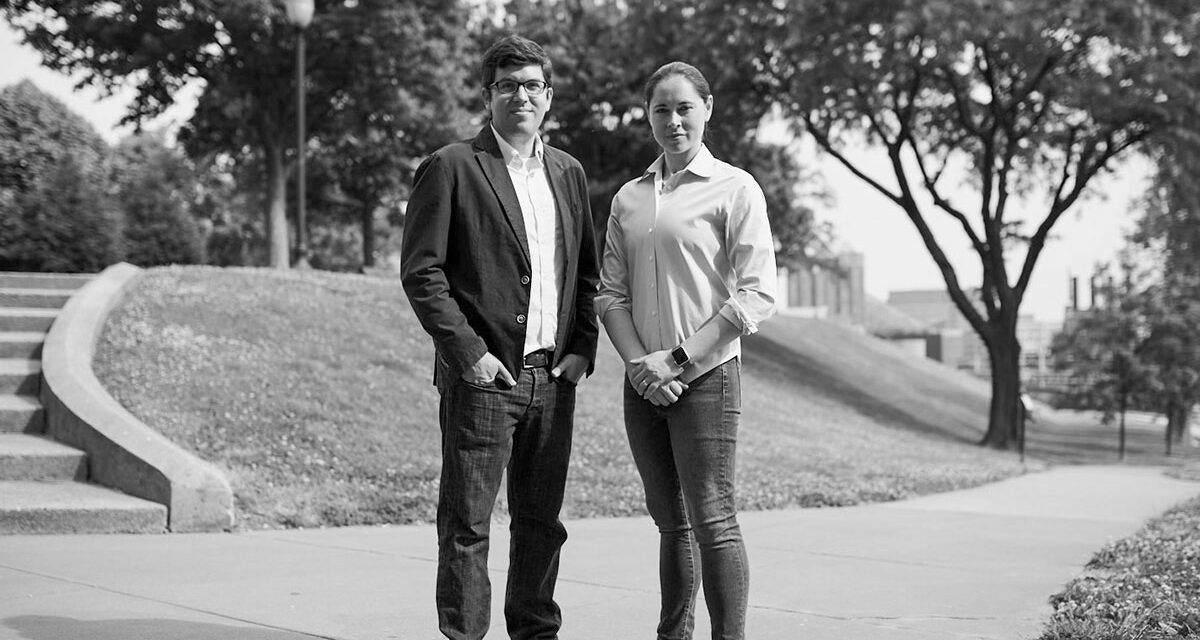
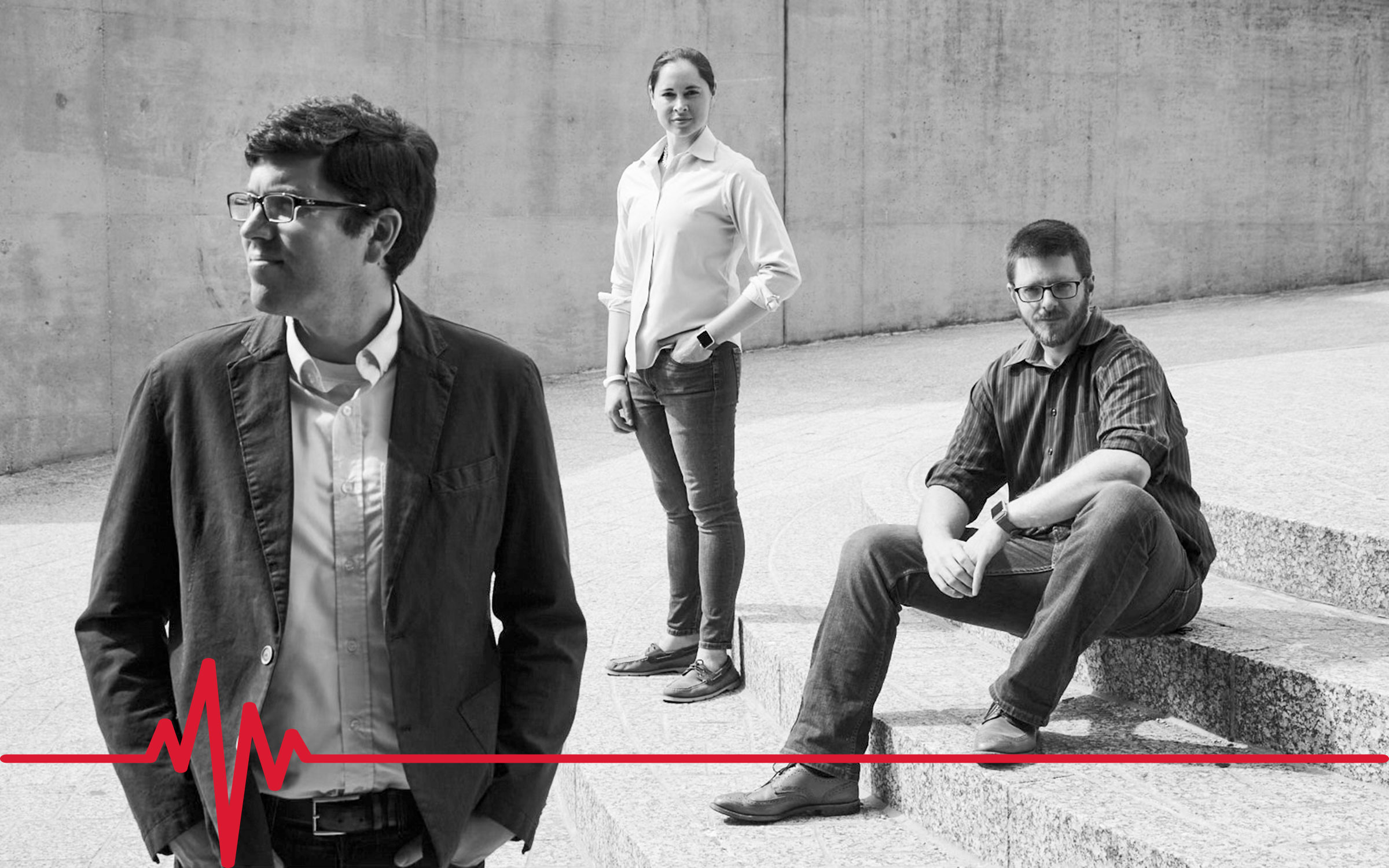
Francoise Marvel ’99 and Corrie co-founders, Seth Martin and Matthias Lee | Photo by Geordie Wood
Matters of the Heart
Dr. Francoise Marvel ’99 is changing lives with innovative technology
BY JESSICA YARMOSKY
Medicine is a vast, ever-changing field. The first physician probably practiced over 6,000 years ago, according to ancient records. And for probably just as long, a debate has smoldered about whether the practice of medicine is pure science—medical professionals applying deeply-learned knowledge over and over; or whether it’s an art, requiring deep intuition and a sense that every patient requires different things from their doctors. The answer, as many medical professionals will probably tell you, appears to be both. And perhaps no doctor better exemplifies that combination—of a vast knowledge base honed over many years, and an individualized, intuitive, artistic approach to medicine—than Dr. Francoise Marvel.
On any given day, Francoise wears different hats—several of them. She serves patients as a cardiologist as part of the Johns Hopkins Hospital in Baltimore, Maryland, and core faculty of the Johns Hopkins Ciccarone Center for the Prevention of Cardiovascular Disease caring for people with cardiovascular disease and genetic lipid disorders. As an assistant professor, she also guides Johns Hopkins University School of Medicine medical students, and medical interns, medical residents, and fellows as they learn the science—and art—of cardiology. Those two jobs would be enough for many, but Francoise, as it may become clear, isn’t “many.” There’s her work with the John Hopkins Digital Health Innovation Lab, which she helped start and now co-directs. The question the lab tries to answer is simple: how can technology—smartphone apps, wearable devices, machine learning—help patients get better care and achieve better health? To find answers, Francoise and a team of cardiologists, fellows, graduate students, nurses, PhD.s, and premedical undergraduate students—pore over studies and clinical trials, collaborating with groups like the American Heart Association and the American College of Cardiology.
And when she’s not taking care of patients or engaging in digital health innovation, Francoise spends the majority of the rest of her professional time within the tech innovation and entrepreneurial space. She co-chairs the American College of Cardiology Entrepreneurial Work Group and serves on the National American Heart Association Atrial Fibrillation System of Care Group Advisory Board. Francoise also is engaged in disseminating the tech innovation to a broader global community through her role as American Heart Association’s Section Editor for Digital Health for the Journal of the American Heart Association.
She helps these groups innovate around health technology, figure out how to scale helpful products, and partner with organizations and entrepreneurs to bring health technology to the next level. On top of all that, she’s the co-founder of Corrie Health, Inc., which makes an evidenced-based digital health platform co-designed with Apple that has been shown to improve patient outcomes and engagement after medical events like heart attacks.
We’d all forgive her for being exhausted, but Francoise seems anything but. She is chipper, sharp, and downright funny.
And to think there was a time when none of this seemed like it was ever going to happen. A time when cardiology wasn’t even on Francoise’s radar. A time when she thought she might make a successful OBGYN. But along the way, thanks to a family member’s health issues, months spent seeking answers, and a drive to make life for all patients easier—Francoise had what can only be (appropriately) described as a change of heart.
LONG DAYS AND RIGOROUS ACADEMICS
The foundation of Francoise’s career, of course, began when she started at St. Stephen’s and St. Agnes in eighth grade. She credits her parents, Yvonne and Hynson Marvel II, for giving her the opportunity to attend the school. Her five years there gave her the character, knowledge base, and skill set to “be someone who was eager to be a leader and make change in the world,” she says. “And I know that’s a pretty bold statement to make,” she adds. “But I think that’s what St. Stephen’s and St. Agnes is known for.”
SSSAS pushed her to be well-rounded—meeting high academic standards and also excelling on the lacrosse field and basketball court. “I could fill a day with everything from learning across multiple subjects, to training my body and my mind, to networking and being part of a class of people who were headed off to do wonderful things,” she says. She says her teachers and coaches, namely Kevin Handel, Kathy Jenkins, and Bernadette Kozlowsi, inspired her academically and athletically. (Kozlowski once allowed her to dissect a rabbit, rather than a smaller fetal pig, because Francoise wanted to explore anatomy more deeply than a fetal pig would have allowed.) Classmates Katie Musser, Stephanie Cheng, Stephanie Beyer, Caroline Bellino, Summer Crabtree, and Regina Kline gave her support and friendship. And she credits SSSAS—where she took on several endeavors simultaneously—with her drive to succeed in challenging circumstances. “Some people say, ‘You started a company during residency?’ The answer is yes,” she laughs. “But I feel like that’s something [SSSAS] expected from the beginning. You had long days and rigorous academics for a reason…Those tough days were just preparing me to be an incredibly productive person, a contributor.”
A DIGITAL SPACE IN PUBLIC HEALTH
In her current roles, Francoise makes thousands of micro-decisions a day, quickly and with confidence. That’s a trait she’s been honing for decades, so it’s no surprise that when she graduated from SSSAS she knew without question that she wanted to study pre-med. Francoise says she evaluated other schools, but was drawn to the University of Virginia’s mission, campus, and what she considered to be the best pre-med training opportunity. She was also inspired by Saints alumni: “I loved how many of my classmates and alumni, who I was very impressed with, were there,” she says. “I wanted to follow in their footsteps.”
The University of Virginia brought four years of intensive pre-med training and opened Francoise’s eyes to the appeal, and potential, of the digital health space. And it inspired her to take some time before going straight to medical school. “I was very interested in getting involved in what was happening in the digital space,” she says, “but also from a public health epidemiology standpoint.” That interest brought her to the University of Miami’s department of Public Health and Epidemiology, which at the time, was a leader in the burgeoning digital health space. This was the early 2000s. At the time, smartphones didn’t exist as we know them— clinicians used personal digital assistants (PDAs), which were akin to small, handheld computers. For four years, Francoise worked on delivering protocols for clinicians that could be delivered at scale through PDAs, to help with adolescent health outcomes in high-risk, low-income, minority communities. These communities tend to have poorer health outcomes, and Francoise’s work with PDAs was meant to help bridge that digital divide. She says her time in Miami, during which she worked on several national and international projects, was fascinating. But after four years, she was ready to apply to medical school, and wanted to join the most tech-forward program possible.
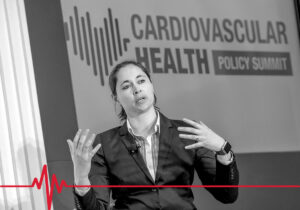
Photo by Jessica Yurinko
MADRUGA AND MARVEL’S BLACK BOOK
That program turned out to be on the opposite end of Florida, at Florida State University in Tallahassee. Francoise wanted to train at a place that relied on the latest technological advances. And FSU, it turned out, was the first program of its kind to train future doctors on touch-screen devices. “You could read, you could do different activities on it,” Francoise says. “I thought that was so cool and forward thinking.” She went to Tallahassee ready to take on the challenges of medical school—and then some.
It was at FSU that Francoise developed what would become her first app. The idea was simple. While in training, medical students often carried around little black books, where they’d take notes on cases, and then refer to those notes when treating patients. The problem? “Doctors are really famous for having chicken-scratch handwriting,” Francoise laughs. “A lot of times, I’d look at the notes and be like, Gosh, I can barely make this out. I hope I’m applying this right.” Francoise thought there may be a solution in something that had hit the market just a couple years before—the smartphone. “I thought, ‘Well, I have my phone here,’” she says. “Why isn’t there something where I could just look it up?” The wheels kept turning. “Why am I using my own notes? What if I had the attending’s notes? The program director’s notes?” she wondered, referring to the higher-level medical staff she was learning from.
Those questions culminated in an app called Madruga and Marvel’s Black Book, named for her and the program director, Dr. Mario Marduga, with whom she worked to develop it. The app is a guideline to clinical “pearls”—those nuggets of medical wisdom that get handed down from trainer to trainee—and Francoise says the process of making it was incredible. “The experience of working with engineers, coming up with something and realizing that if you work hard enough and get the right people involved, you can get to that end result,” she says, “and design something that helps other people, is incredible.” Those other people who got the immediate benefit of the app? Francoise’s fellow med students, who used it regularly. “It was a great experience, and I learned a lot doing it,” she says.
“ALL OF A SUDDEN, MY DAD IS A PATIENT”
By July 2012, Francoise’s career path seemed to be shaping up nicely. She had years of experience in public health, an M.D., and an app under her belt. Then, it was off to Georgetown University in Washington, D.C., to begin a post-grad year in the Obstetrics Department. There, she worked across three different hospitals and in the subspecialties of ultrasound and reproductive endocrinology. But during that year, something profound happened. Her father became ill and was diagnosed with cardiovascular disease.
His diagnosis would upend Francoise’s life—and her career plans. After her Georgetown post-grad year came to an end, it was no longer obstetrics she had on the brain, it was cardiology. She decided to enter John Hopkins Bayview Hospital’s internal medicine residency program even though that meant redoing her intern year, often known as the most brutal year of residency. (She would later go on to complete a three-year cardiology fellowship, receiving the highest quality training in the field.)
Francoise’s father became a patient at Johns Hopkins Hospital, one of the hospitals in which Francoise completed rotations in Internal Medicine training. Residency is notoriously tough, but her father’s diagnosis proved an added challenge for Francoise. “I’m learning to become a doctor, and taking care of patients,” she says, “and all of a sudden, my dad is a patient.” After doing normal intern duties like rounds, Francoise would go straight to her father’s bedside—which came with a stark recognition. “I realized for the first time that I hadn’t really understood what it was like to be a patient,” she says. The amount of information her father received was overwhelming, even though, Francoise notes, he was smart and had attained a high level of education.
The solution came to her “like a lightning bolt,” Francoise says. “I realized I could be applying my passion and my interest for health technologies to empowering and engaging the patient at their bedside.” Too often, patients—especially those with complex cases—feel powerless and lack the broad medical knowledge base that can help them make informed medical decisions, and keep themselves healthy and out of the hospital. “I thought it would be powerful to give patients the tools they need to help them understand what they’re going through in the hospital, and what their health condition is,” she says. “How to recover from something, what medications do, how to take their own vitals—and what do those even mean?”
And that’s how Corrie began.
BUILDING UNDERSTANDING
Co-founded with another Johns Hopkins cardiologist Dr. Seth Martin, M.D. M.H.S. and engineer Dr. Matthias Lee, Ph.D., Corrie’s mission is to improve patient and clinician engagement and experience using health technology. Put simply, Corrie’s app helps patients improve their health after they leave the hospital following a major cardiac event, like a heart attack.
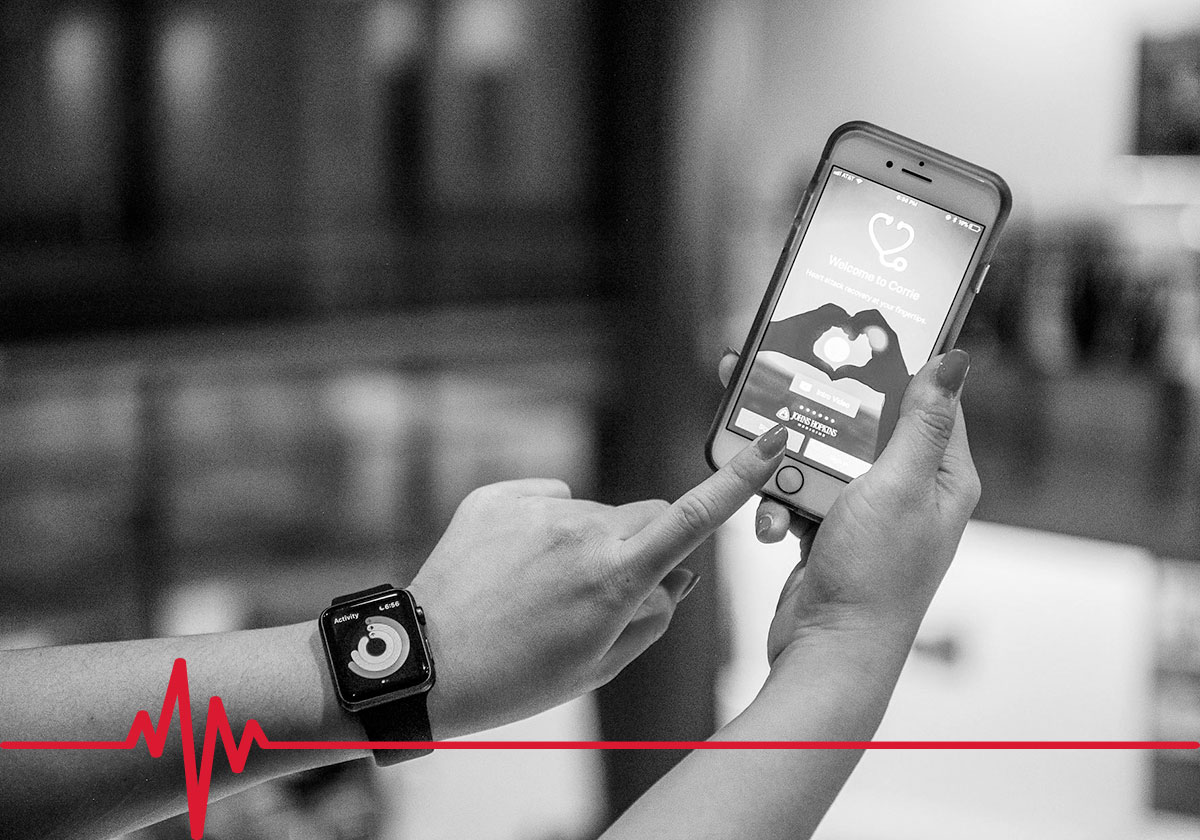
Photo by Ryan Demo
“I realized I could be applying my passion and my interest for health technologies to empowering and engaging the patient at their bedside.”
Francoise was inspired not only by her father, but by a slate of her own patients, who were often confused by what to do when they returned home from the hospital. She spoke of one patient, who had underlying coronary artery disease, which resulted in a heart attack. In the hospital, medical professionals are extremely adept at treating patients after heart attacks— “We’re very good at getting the issue addressed, even if it requires surgical intervention,” she says. “We’re exceptional at getting that done effectively, and then getting necessary medication started while patients are in the hospital.” But where breakdowns in care start to occur is when patients are ready to be discharged. “The patient who’s leaving is getting a stack of paperwork,” she says. “He’s super confused about what he’s supposed to do. He thought he came in with chest pain after being what he considered to be healthy. And now he’s leaving with three appointments, eight medications, and some sort of stent in his heart. He’s not sure what to do.”
That’s where Corrie comes in. The app takes decades of research and expertise around how to best care for people after they’ve had a cardiovascular event, and delivers it to the patient at the right time, when they’re ready to take back control of their health. Corrie connects to smart watches and blood pressure monitors, and can track patient’s vitals and physical activities. It reminds patients to take medications and about upcoming appointments. And it also provides informational videos on what heart disease is and the importance of small lifestyle changes. Francoise mentions another patient, a young man who was recovering from a heart attack. “He said, Dr. Marvel, I was given instructions, but not understanding,” she says. “And the difference between Corrie and the current standard of care is that we can give plenty of instructions. But if we’re really trying to change and improve people’s lives, we’ve got to build that understanding.”
Currently, Corrie helps patients with coronary artery disease and is also testing a virtual cardiac rehab model, which Francoise says is exciting. “We started with just heart attack patients, and we have now expanded so we can serve more populations,” she says. That means people with heart failure and those who have undergone cardiac transplants and bypass surgery. And Francoise plans to expand Corrie to outside the heart unit, too. “We absolutely see this growing beyond cardiology,” she says. Corrie is currently launching a clinical trial to study atrial fibrillation, the number one cause of stroke in the U.S. And Francoise hopes that the impact of Corrie will someday touch patients who’ve experienced a wide variety of medical issues and also help address cardiovascular risks, like high cholesterol, before they lead to a health condition like a heart attack or stroke, this is something called primary cardiovascular prevention. “The concept is universal,” she says. “We want to help patients better engage with their health experience and their understanding, while managing a newly-diagnosed or chronic health condition. We can do better.”
And doing better, they are. In a recent study, patients who used Corrie had a 10 percent absolute lower risk of being readmitted to the hospital within 30 days than patients who didn’t use the app.
Francoise’s days are filled with not only the exciting discoveries that come with leading a burgeoning tech company, but also the sometimes rote tasks that come with being a dedicated medical provider. If there’s one thing she wants people to know about her field, it’s that innovative technology can change lives. “If you’re a patient and you’re experiencing a health condition that you want to manage better, technology has a role,” she says. “If you’re a clinician and trying to figure out if you’re doing as you should…technology has a role there, too.” If medicine is both a science and an art, Dr. Francoise Marvel excels in both.

